Saigon dental implants have become the top choice for international patients seeking high-quality, affordable smile restorations. This article provides a comprehensive guide to dental implants in Saigon, empowering you to make informed decisions and achieve a long-lasting solution for tooth loss.
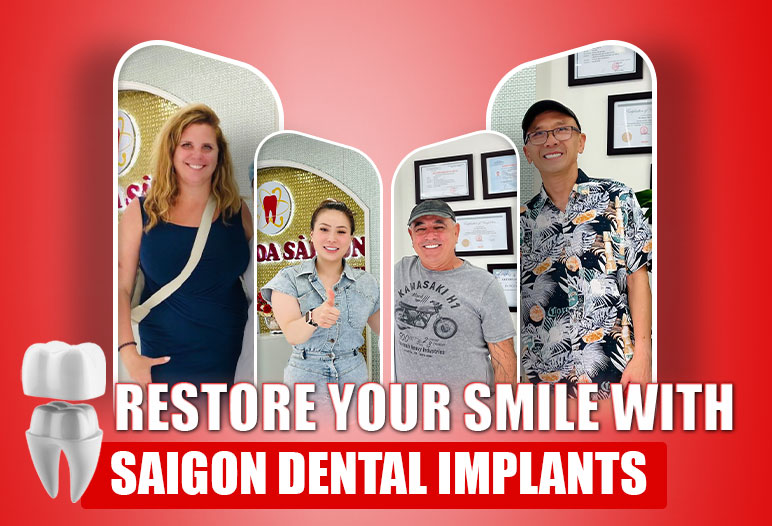
What is a dental implants, and how does it work?
A healthy and beautiful smile is a cornerstone of confidence and self-esteem. However, tooth loss due to injury, decay, or gum disease can have a significant impact on your oral health and overall well-being. While dentures and bridges have long been the go-to options for replacing missing teeth, dental implants have emerged as a revolutionary solution, offering a natural and durable restoration with numerous benefits. In Saigon, a bustling metropolis with a vibrant dental landscape, finding a qualified dental professional to perform implant surgery is easier than ever.
Dental implants are often described as the gold standard in tooth replacement solutions. At its core, a dental implants is a titanium screw that functions as an artificial tooth root, expertly placed into the jawbone. This biocompatible material seamlessly integrates with the bone over time, creating a sturdy foundation for a crown or denture. Understanding how dental implants work involves exploring the intricacies of their placement and integration within the body.
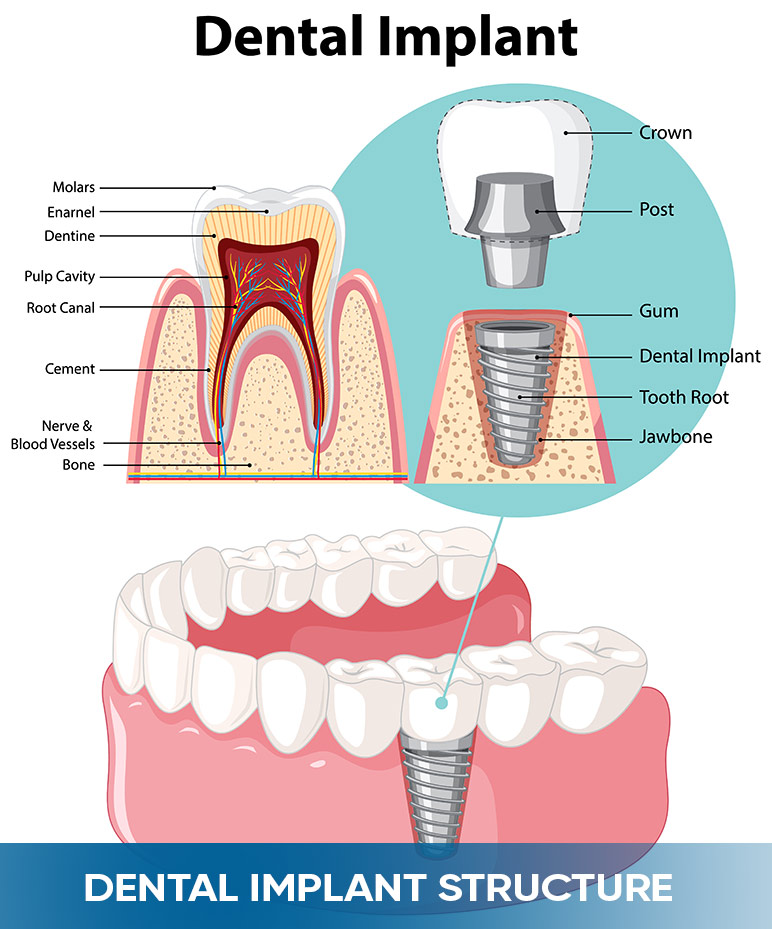
The Implant Placement Process
The journey to restoring your smile begins with the implant placement process. A qualified dental surgeon makes a small incision in the gum tissue to expose the jawbone. The titanium implant is carefully placed into the bone, creating a secure anchoring point. This phase is crucial, as the success of the entire procedure hinges on the proper placement of the implant. After the implant is positioned, the incision is sutured closed, allowing the implant to integrate with the bone over the next few months. This process, known as osseointegration, is vital for ensuring the stability and longevity of the implant.
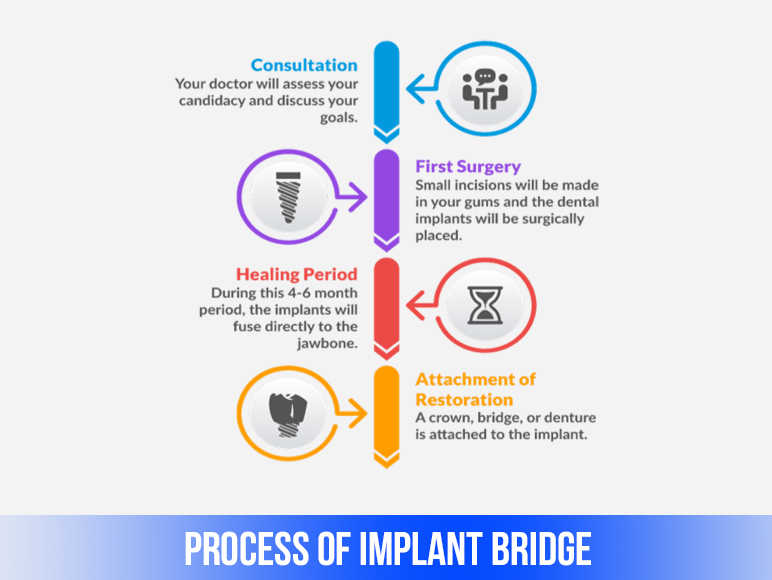
Abutment Attachment and Crown Placement
Once the implant has successfully integrated with the bone—usually taking between three to six months—the next step involves attaching an abutment. This small connector serves as a bridge between the implant and the crown. During this procedure, the gum tissue is reopened, and the abutment is securely attached to the implant. Following this, a custom-made crown is fabricated in a dental laboratory to match the shape, size, and color of your natural teeth. The final step involves securing the crown to the abutment, completing the implant restoration process.
Understanding Osseointegration
Osseointegration is a critical component of the dental implants process. This biological phenomenon refers to the direct structural and functional connection between living bone and the surface of the implant. Over time, the jawbone grows around the implant, effectively anchoring it in place. Factors such as bone density, overall health, and adherence to post-operative care can influence the success of osseointegration. It’s essential to follow your dentist’s recommendations during this healing phase to ensure optimal results.
What are the benefits of dental implants compared to other tooth replacement options?
Dental implants have gained significant popularity due to their numerous advantages over traditional solutions like dentures and bridges. Understanding these benefits can help individuals make informed decisions about their dental health.
Natural Appearance and Feel
One of the most compelling reasons people opt for dental implants is their natural appearance and feel. Unlike dentures, which can sometimes look artificial, implants mimic the structure and function of natural teeth. This results in a more aesthetically pleasing and comfortable restoration. Patients often report feeling more confident in social situations because their smiles look authentic. Additionally, implants do not shift or slip, providing a secure and stable bite, which enhances the overall eating experience.

Improved Oral Health
Dental implants offer significant advantages for oral health. By preserving the jawbone, implants prevent bone loss and maintain the integrity of your facial structure. When a tooth is lost, the surrounding bone can begin to deteriorate, leading to a sunken appearance and further dental issues. Implants stimulate the jawbone, promoting healthy bone growth and preventing the complications associated with missing teeth. This preservation of bone also contributes to maintaining a youthful appearance, making dental implants an appealing option for those concerned about aging.
Durable and Long-Lasting Solution
Another significant benefit of dental implants is their durability. With proper care, implants can last for decades, making them a long-term solution to tooth loss. Unlike dentures, which may require frequent replacements, implants minimize the need for future interventions. This longevity translates to cost savings over time, as patients can avoid the expenses associated with regular denture replacements and adjustments.
Enhanced Self-Confidence
A restored, healthy smile can have a remarkable impact on self-esteem and social interactions. Many individuals who choose dental implants report feeling more confident and willing to engage in social activities. The ability to eat, speak, and smile without worry can significantly enhance one’s quality of life. Moreover, the psychological benefits of having a complete smile should not be underestimated; improved self-confidence can lead to better personal and professional relationships.
How long does the dental implants process take at Saigon Dental Implants Center?
The overall duration of the dental implants process varies depending on factors such as the number of implants required, the complexity of the case, and the individual’s healing response. Understanding the timeline can help patients prepare for what to expect throughout their journey to a restored smile.
Initial Consultation and Planning
The first step in the dental implants process is the initial consultation. During this appointment, the dentist conducts a thorough examination, including X-rays, to assess the condition of the jawbone and determine the best implant strategy for your specific situation. This planning phase is crucial, as it sets the foundation for the entire procedure. Depending on the complexity of the case, additional procedures such as bone grafting may be necessary, which can extend the overall timeline.
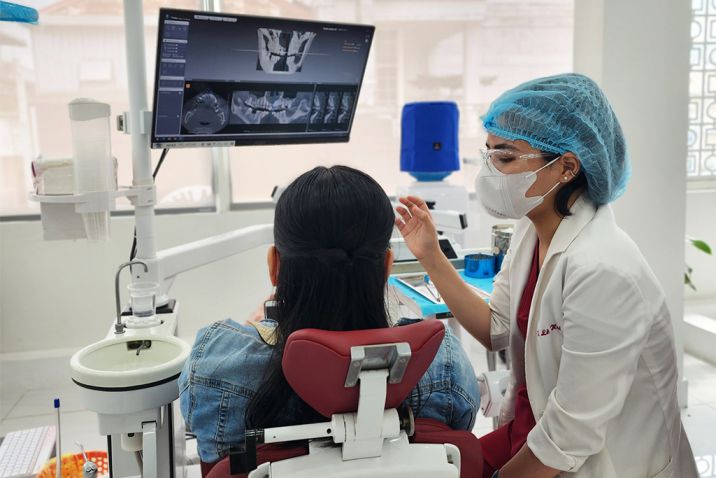
Implant Placement and Osseointegration
After the initial consultation, the next phase involves the actual placement of the implant. This surgical procedure typically takes about one to two hours per implant. Once the implant is placed, the osseointegration phase begins. This phase usually lasts between three to six months, during which the implant fuses with the jawbone. The length of this period can vary based on individual healing rates and the quality of the bone. Regular follow-up appointments will be scheduled to monitor the healing process.
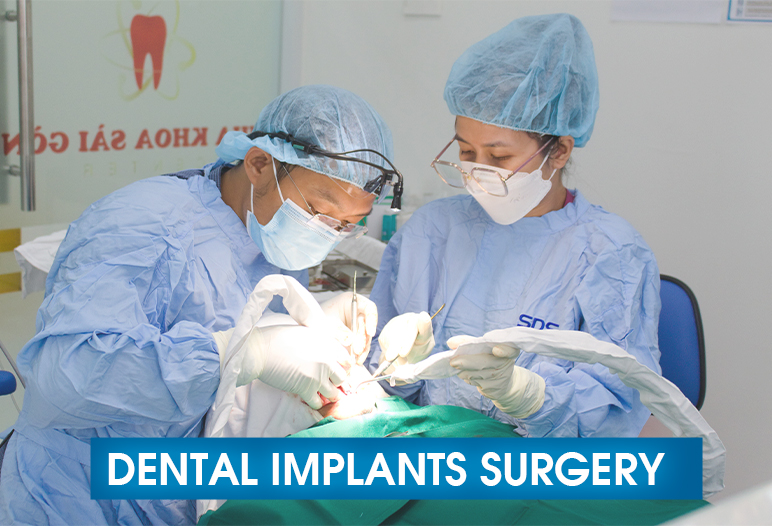
Abutment Placement and Crown Fabrication
Once osseointegration is complete, the abutment placement procedure can take place. This procedure is generally performed under local anesthesia and takes about 30 minutes. After the abutment is attached, the dental laboratory will create a custom-made crown tailored to fit your mouth perfectly. The fabrication of the crown can take several weeks, depending on the lab’s workload and the complexity of the design. Once the crown is ready, the final appointment will involve securing it to the abutment, completing the dental implants process.
Results of Saigon Dental Implants
Restore your smile with Saigon Dental Implants. We offer a variety of implant solutions, from single-tooth replacements to full-arch restorations using All-on-4 or All-on-6 techniques, as well as zygoma implants. Our experienced dentists create personalized treatment plans to suit your unique needs. Enjoy a comfortable and confident smile with our natural-looking dental implants.
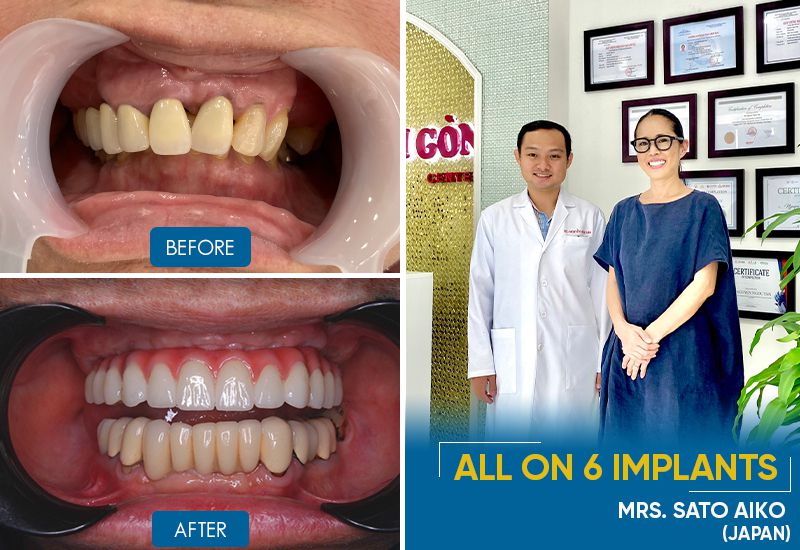
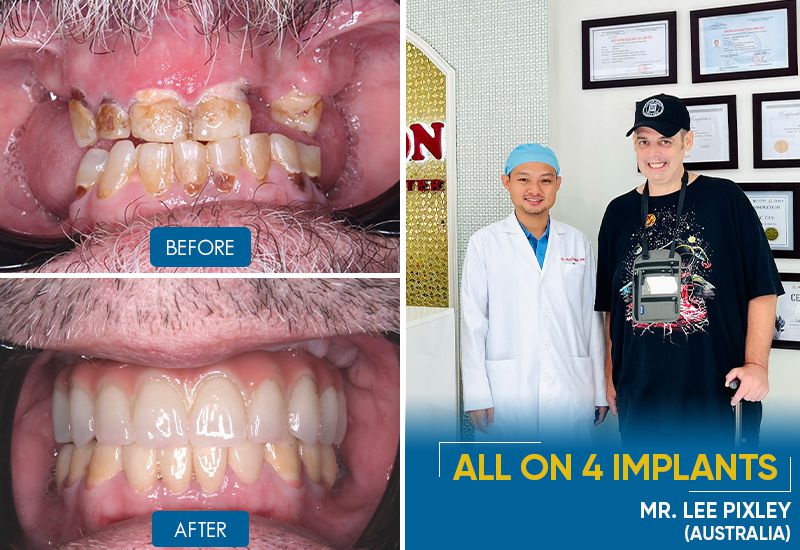

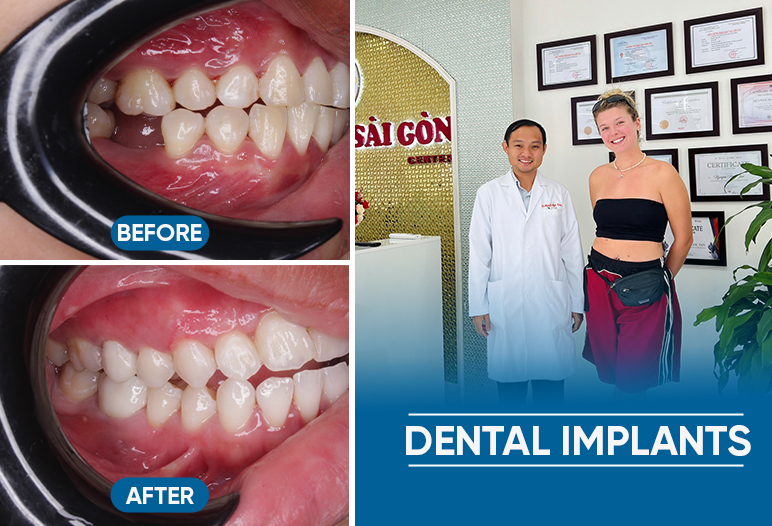
What is the recovery process like after dental implants surgery?
Recovery after dental implants surgery is an essential aspect of the overall process. Understanding what to expect can help patients navigate this phase with ease and confidence.
Post-Operative Discomfort and Swelling
After the surgery, it is common to experience some discomfort and swelling around the surgical site. This is a natural part of the healing process. Your dentist will provide detailed post-operative instructions, including guidelines for pain management. Over-the-counter pain relievers or prescription medications can be used to manage any discomfort. Swelling can be controlled by applying ice packs to the surgical area, which helps reduce inflammation and promotes healing.
Maintaining Oral Hygiene
Oral hygiene is crucial during the recovery process. While it’s essential to maintain meticulous oral hygiene, patients should avoid brushing or flossing directly on the surgical site for the first few days. Gentle rinsing with warm salt water can help keep the area clean without disturbing the healing tissues. As the healing progresses, patients can gradually return to their normal oral hygiene routine, but they should continue to be cautious around the implant site until fully healed.
Diet and Activity Restrictions
During the initial recovery period, patients are advised to stick to soft foods and avoid chewing on the implant side for a specific period. Foods such as yogurt, smoothies, and mashed potatoes can be excellent choices during this time. It’s also important to stay hydrated and avoid hot beverages that could irritate the surgical site. Regarding physical activity, patients should rest and avoid strenuous activities for a week or two to allow the surgical site to heal properly. Gradually resuming normal activities is encouraged, but it’s essential to listen to your body and consult your dentist if any concerns arise.
Do I need to visit my regular dentist after getting Saigon dental implants?
While dental implants are durable and long-lasting, they require regular maintenance for optimal care. Understanding the importance of follow-up visits can help ensure the longevity of your implants.
Routine Checkups and Cleanings
Visiting your dentist for regular checkups and cleanings is crucial for maintaining oral health and detecting any potential issues early. Routine dental visits allow your dentist to monitor the health of your implants and surrounding teeth and gums. Professional cleanings help remove plaque and tartar buildup, reducing the risk of infections that could compromise the success of your implants.
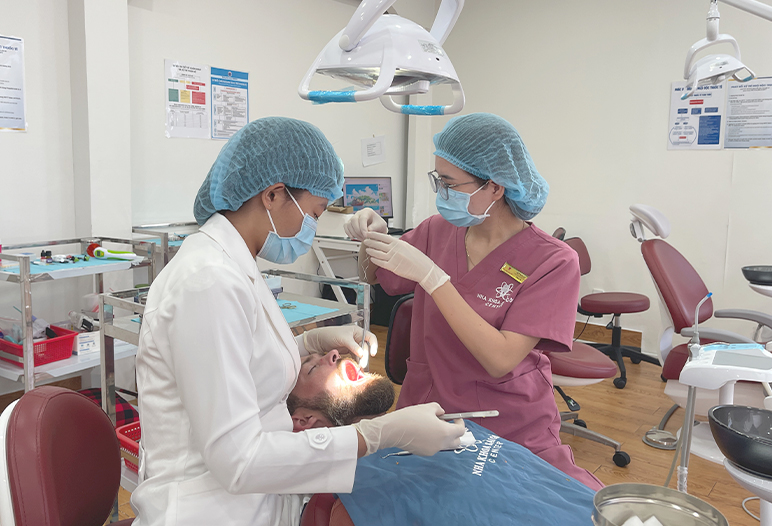
Prompt Attention to Dental Issues
Although dental implants themselves do not decay, the surrounding teeth and gums need to be kept clean to prevent infections. Any discomfort, swelling, or changes in the implant area should be reported to your dentist immediately for prompt attention. Early intervention can prevent minor issues from escalating into more significant problems, ensuring the long-term success of your dental implants.
Long-Term Maintenance
In addition to regular checkups, maintaining good oral hygiene at home is essential for the longevity of your dental implants. Brushing twice a day, flossing daily, and using an antibacterial mouthwash can help keep your mouth healthy. Your dentist may also recommend specific cleaning tools designed for implant care, such as interdental brushes or water flossers, to help you maintain optimal oral hygiene.
How much do dental implants cost in Saigon?
The cost of dental implants in Saigon varies widely depending on various factors. Understanding these factors can help individuals budget for their dental care and make informed decisions.
Number of Implants Needed
The number of implants required plays a significant role in determining the overall cost. Patients needing multiple implants will naturally incur higher expenses than those requiring only one. Additionally, the complexity of the case can affect pricing; for example, patients requiring bone grafting or sinus lifts may face additional costs related to these procedures.
Type of Implant and Materials Used
Different implants have varying prices based on their quality and features. Some clinics may offer premium implants made from advanced materials designed for enhanced durability and aesthetics. While these options may come at a higher price, they often provide long-term benefits that justify the investment. It’s essential to discuss the types of implants available with your dentist to understand the best options for your specific needs.
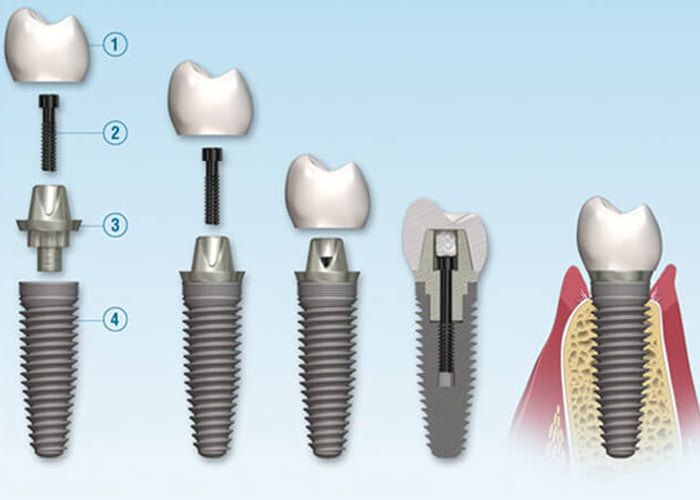
Dentist’s Expertise and Clinic Location
The expertise of the dentist performing the procedure can also influence the cost. Experienced dentists with specialized training in implant dentistry may charge higher fees for their services. Additionally, clinics located in prime areas or equipped with advanced technology may have higher consultation fees. It’s advisable to compare prices among different clinics while considering the qualifications and reputation of the dental professionals involved.
Dental implants cost in Saigon
To assist you in making an informed decision, we provide a detailed fee schedule outlining all costs associated with dental implant procedures. This transparency allows you to plan your treatment accordingly.
| SINGLE-TOOTH IMPLANTS | DENTAL COST (USD) | DISCOUNT PRICE (USD) |
| Premium Korean implant (Dentium) | 800 | 720 |
| US implant (Dentium) | 960 | 880 |
| Italian implant (C-Tech) | 1,000 | 920 |
| US implant (Superline) | 1,080 | 1,000 |
| France/Switzerland (Kontact / Neodent) | 1,240 | 1,080 |
| Super Active (Nobel/Straumann) | 1,600 | 1,440 |
| Titanium-porcelain restoration | 160 | |
| Full Zirconia CAD/CAM Crown on Implant | 280 | |
| FULL 1 JAW IMPLANTS | DENTAL IMPLANTS COST (USD) | DISCOUNT PRICE (USD) |
| Implant ALL ON 4 Dentium (Korea) (Include screw only + Temporary strengthened crown) | 6,000 | 4,000 |
| Implant ALL ON 4 Straumann Neodent (Swiss) (Include screw only + Temporary strengthened crown) | 7,000 | 5,200 |
| Implant ALL ON 4 Nobel / Straumann SLA Active (Include screw only + Temporary strengthened crown) | 9,000 | 7,200 |
| Implant ALL ON 6 Dentium (Korea) (Include screw only + Temporary strengthened crown) | 8,000 | 5,600 |
| Implant ALL ON 6 Straumann Neodent (Swiss) (Include screw only + Temporary strengthened crown) | 9,000 | 7,600 |
| Implant ALL ON 6 Nobel / Straumann SLA Active (Include screw only + Temporary strengthened crown) | 12,000 | 10,400 |
| Zygomatic Implants – “All on 4”, full arch, fixed bridge | 13,000 | |
| Final bar + High Acrylic Permanent teeth (4–6 Months Later) | 1,400 | |
| Final bar + Full Zirconia CAD/CAM teeth (4–6 Months Later) | 4,000 | |
|
For patients deciding on Implants All-On treatment SAIGON IMPLANT CENTER will give customers a gift package, including: |
|
|
Conclusion
Dental implants offer a transformative solution for restoring your smile and enhancing your quality of life. While the process requires careful planning and execution, the benefits outweigh the initial investment in the long run. When seeking dental implants services in Saigon, choosing a reputable clinic with experienced dentists is paramount. With thorough research, careful consideration, and professional guidance, you can embark on a journey towards achieving a healthy, beautiful, and confident smile. Whether you’re dealing with tooth loss due to injury, decay, or gum disease, dental implants can provide the stability and aesthetic appeal you desire, allowing you to enjoy life to the fullest once again.

 Google Reviews
Google Reviews Call
Call
SAIGON IMPLANT CENTER
Best dentist in Vietnam
Saigon Implant Center - Dental Clinic utilizes the latest technology for specialized treatment in the field of Single implant, full jaw implants, All on 4 implants, All on 6 implants, Zygoma implant....
SAIGON IMPLANT CENTER
Best dentist in Vietnam
Saigon Implant Center - Dental Clinic utilizes the latest technology for specialized treatment in the field of Single implant, full jaw implants, All on 4 implants, All on 6 implants, Zygoma implant....